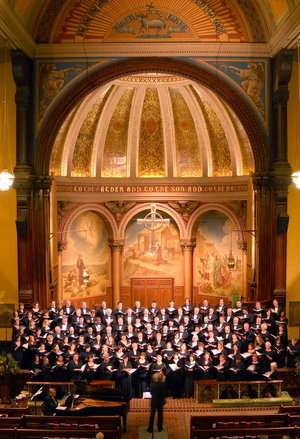|
Back
Polished “Unfinished” Works Philadelphia
Church of the Holy Trinity
02/12/2012 -
Franz Schubert: Symphony No. 8 in B-minor, D. 759
Wolfgang Amadeus Mozart: Requiem, K. 626
Alexandra Maximona (soprano), Margaret Mezzacappa (mezzo-soprano), Zach Borichevsky (tenor), Scott Conner (bass)
Mendelssohn Club of Philadelphia, Alan Harler (artistic director), Symphony in C Orchestra, Rossen Milanov (conductor)

(Courtesy of Symphony in C Orchestra)
Rossen Milanov left his post as associate conductor of the Philadelphia Orchestra. The personable conductor was always game for Fab Phils seasonal concerts - He was maestro Dracula for Halloween, he donned Santa hats for Christmas and liked to engage with audience talks. He showed the most muscle directing the orchestra’s summer series at the Mann Center in Philly and Vale Valley Music Festival in Colorado, often specializing in Russian and Eastern European repertoire. Last spring, his swan song was sharing the Verizon Hall stage with the Pennsylvania Ballet in production new production of Stravinsky’s Pulchinella, choreographed by Jorma Elo.
Milanov is now musical director of Symphony in C (formerly the Haddonfield Symphony), one of the few professional training orchestras in the United States. Milanov teamed up winningly with soloists from the Academy of Vocal Arts and the mighty Mendelssohn Club for “Unfinished Masterpieces”, pairing Schubert and Mozart works, both works ripe for interpretive muscle.
First stop Gordon Theater at Rutgers-Camden Center for the Arts, then to the larger Church of the Holy Trinity on Rittenhouse Square, which is rather perfect for the setting of Schubert’s 8th Symphony and Mozart’s Requiem. Based on this program alone, it is clear that Milanov has command and synergy with this youthful orchestra, showing in ways that may have been underappreciated by Philadelphia Orchestra audiences during his tenure there.
The Schubert’s two movements do make you feel unsatisfied because they are so involving as played by Symphony in C that you want more. From the initial approach of the strings in the Allegro there is such clarity and tempered drive. The woodwinds and brass are particularly vibrant. Most impressive are the striations of the low strings and dramatic orchestral thrust of Schubert. Among the standout lead players- Alexander Bedenko’s sublime clarinet line, as well as by 1st violin Stefani Collins
The Philadelphia Orchestra had deserved triumphal evening last year conducting the Mozart Requiem with incoming star conductor Yannick Nézet-Séguin. But Milanov delivers a more cohesive, indeed, less theatrical, performance. And he conjured it in shimmering details, with chorale, soloists and orchestra with equalized Mozartian power. And with a scaled down orchestra facing off the 100 plus Mendelssohns, it was moving from every angle.
Alexandra Maximova, Margaret Mezzacappa, Zach Borichevsky and Scott Conner have all emerged as AVA stars in the last two years and their work here is just as solid. The silkiness of the solo and chorale overlays are superb. This venue can work against soloists, it has warm acoustics, but can have an echo effect, not an issue with these singers, who were vocally in the moment throughout.
Mendelssohn Club director Alan Harler just keeps adding artistic muscle to this chorus with distinction. There were so many moments that the chorale just went right through you, not just with sonic power of the “Offertorium” and “Sanctus”, but the sustained precision of the baroque Latin liturgical. The pulse of the Symphony in C players, razor sharp in the arrests and in the defining modulations of the choral pickups - underlining Milanov’s clarity through the accents and tempo, build the power from within.
Lewis Whittington
|